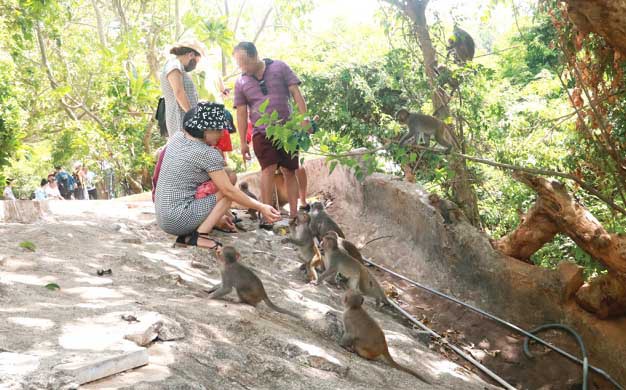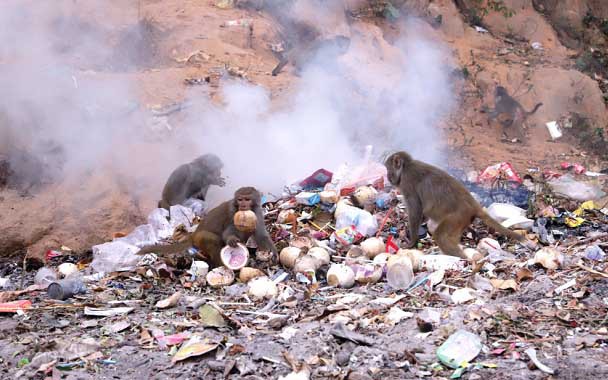Tourists to Son Tra Peninsula in central Vietnam might think that giving food to wild monkeys when exploring the area is just a harmless habit, but the practice has resulted in consequences, including the primates getting used to being fed rather than finding food on their own.
Son Tra Peninsula, which faces the East Vietnam Sea, is a popular destination of the central city of Da Nang.
While wild macaques used to live deep in the forests in the peninsula, it is now easy to spot the animals seeking for food and even attacking people in crowded places in Son Tra.
The issue, which has become more serious over the last few years, is due in part to tourists’ feeding wild monkeys, believing it is a must-do activity when visiting Son Tra, according to local conservationists.
The habit has led to the primates’ decreased ability of seeking food in nature and increased their dependence on people to fill their stomach.
While it was rare to see wild monkeys in crowded places in Son Tra, such as the famous Linh Ung Pagoda, many years ago, they can now be seen in large groups searching or begging for food even in broad daylight, according to Le Xuan Tung, a nature photographer in Da Nang.
The monkeys often gather around the giant Avalokiteshvara statue at Linh Ung Pagoda to beg for food from visitors who want to take a photo of them, taking in return any edible things the tourists have, Tung said.
As Tung took a Tuoi Tre (Youth) newspaper reporter to the pagoda to observe the phenomenon first-hand, your correspondent saw a tourist buying an ice-cream and give it to a monkey, which it enthusiastically consumed.
The macaques also frequent a garbage dump behind the pagoda to search for food and fruit left over by tourists, Tung said, adding he has a mixed feeling about the changing habits of the primates.
“I have never thought that our goodwill would affect their natural instinct in such a negative way,” Tung expressed regret for his personal contribution to this problem, as he had also given wild monkeys fruit as a reward for their cooperation in his photo shoots.
|
|
| Wild monkeys search for food at a garbage dump in Son Tra Peninsula, central Vietnam. Photo: Truong Trung / Tuoi Tre |
Bui Van Tuan, head of the research division of GreenViet Biodiversity Conservation Center, added that feeding wild monkeys has also led to unwanted consequences such as visitors being attacked, robbed of their belongings or even catching diseases from the animals.
Doctor Ha Thang Long, a Vietnamese representative of Frankfurt Zoological Society in Germany, said that tourists have accidentally changed the survival instinct of the younger generations of monkeys in Son Tra Peninsula, when mother monkeys taught their children to beg for food from visitors instead of finding things to eat in the woods.
He also stated that wild monkeys suffer from obesity because of the high-calorie foods given by the tourists, or have contracted intestinal diseases from rotten food they found in garbage dumps.
“People could easily get affected by these diseases contacting the monkeys,” he warned.
“Wild monkeys are not pets, so feeding them is unnecessary.”
Phan Minh Hai, the deputy head of the management of Son Tra peninsula and beach services in Da Nang, has called on the municipal tourism department to warn the public not to feed wild monkeys or litter while in the area.
Like us on Facebook or follow us on Twitter to get the latest news about Vietnam!






















































